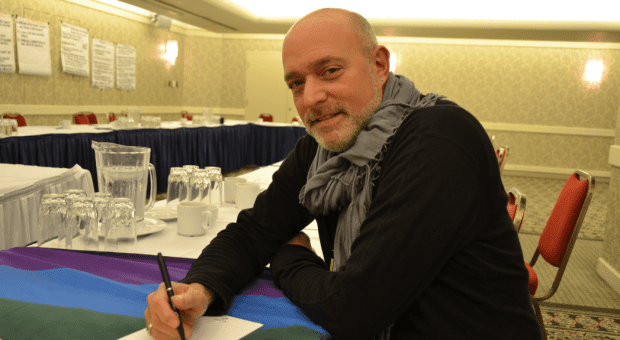A Ugandan gay rights activist who was supposed to attend the InterPride 2013 conference in Montreal has been denied entry to Canada.
“I am so disappointed,” says Andrew Waiswa, founder and executive director of Gender Equality and Health Organization (GEHO), a queer organization in Jinja. His group operates a network of safe houses in eastern Uganda for queer people fleeing homophobic families and police; hosts a small Pride march; and provides HIV outreach and education.
Waiswa says that, before boarding the plane, he was told his documents were not in order, and he was left grounded in Uganda.
InterPride’s Alan Jay Reiff says he held out hope that Waiswa could still make it to the conference by Oct 11, but that didn’t happen.
“I know Andrew is terribly upset. All of us at InterPride are extremely upset, primarily because he is not here,” he says. “We wanted him here. We want his input. We worked very hard to elevate him to be a part of the international community. The secondary concern is a lot of money has now been spent.”
GEHO joined InterPride last year, Reiff says. “That was a wonderful asset for us. And since he’s very involved politically in Uganda, we asked him to come speak at the conference to tell us about what is happening in Africa, especially in Uganda with the ‘Kill the Gays’ bill.”
InterPride has been working with Waiswa to help him become an international human rights leader by working to bring more money and focus to the work he does.
Waiswa was awarded a $3,000 scholarship from InterPride. The money was intended to cover his airfare, conference registration and anything else he might need while in Canada.
“He was lucky enough to be awarded the scholarship,” Reiff says. “Since I believe in his organization, I paid for his airfare out of my own pocket to bring him here.”
When he spoke to Waiswa two or three months ago, Reiff learned that Waiswa had been in Canada just last year, seeking asylum to escape a murder threat in Uganda.
For two years between 2010 and 2012, Waiswa lived in Toronto as a refugee. He returned to Uganda to continue the fight against the anti-gay legislation and begin working to set up GEHO.
When making arrangements to return to Canada, Waiswa discovered the visa inside his passport was invalid; he journeyed five hours to the Canadian high commission in Nairobi, Kenya, to renew it.
Unfortunately, he had not foreseen the tragedy that had happened the week before. More than 70 people were killed at Nairobi’s Westgate Mall in a violent siege that began Sept 21.
Waiswa arrived in Nairobi to sort out his visa paperwork but faced the terrible news, Reiff says. “Because of the violence at the mall, the Canadian embassy was backlogged to get people out of Kenya, so his application went to the bottom of the pile.”
“He showed his airfare and a letter from InterPride stating that he was coming to a conference, so they told him to come back two days before his flight.”
When Waiswa returned, the embassy told him his visa was not ready because there were “other priorities.” He was sent back to Jinja.
He travelled back to Nairobi to pick up the visa but was crushed to learn it had been denied.
“The Canadian embassy refused the visa because they did not believe he would return to Uganda,” Reiff says. “They told him he’s a flight risk. So the problem came from the Canadian embassy visa department in Nairobi.”
“We’re all very concerned about what happened,” he adds. “This situation has inadvertently and unfortunately affected his credibility on the international scene, through no fault of his own. No one believes this was intentional. Going forward, we will try to fix this, but mostly we hope that he’s safe and okay.”

 Why you can trust Xtra
Why you can trust Xtra


